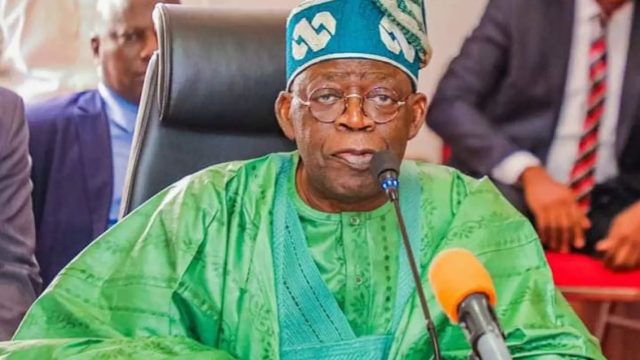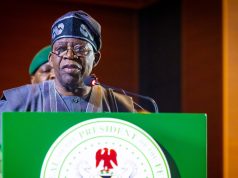President Bola Tinubu on Friday appealed to power generation companies (GenCos) to give the federal government more time to complete the verification and validation of longstanding debts owed to them.
During a meeting with members of the Association of Power Generation Companies, led by Sani Bello, at the Presidential Villa in Abuja, the President assured them of his administration’s commitment to resolving the liquidity challenges in the power sector, the Special Adviser to Mr Tinubu on Information and Strategy, Bayo Onanuga, said in a statement.
In April, GenCos warned of imminent shutdown due to a N4 trillion debt owed by the Nigerian government for electricity generated and supplied to the national grid.
The firms said the debt, which includes N2 trillion for 2024 and N1.9 trillion in legacy debts, is threatening the continued operation of their power generation plants.
In the statement, Mr Onanuga said the Special Adviser to the President on Energy, Olu Verheijen, disclosed that a N4 trillion bond programme has received anticipatory approval from Mr Tinubu to address the liquidity shortfall in the sector.
Mr Tinubu acknowledged the historic liabilities inherited from previous administrations and pledged transparency and fairness in addressing them.
“I accept the assets and liabilities of my predecessors, and there is no question about that. But that acceptance must be on credible grounds. I need to wear the audit cap of verifiability, authenticity, and the fact that this inheritance is not a mere deodorant but a support structure for critical economic and industrial promotion,” Mr Tinubu was quoted as saying.
He emphasised the need for patience from GENCOs and financial institutions, noting that government agencies are actively engaging audit and legal firms to scrutinise the claims.
“We are here. So market it to your other colleagues. Give us time to do verification and validation of the numbers,” he said.
While reaffirming his belief in a market-driven electricity sector, the president said the industry’s long-neglected legacy issues are now receiving the attention they deserve.
“This is a longstanding issue that is now being dealt with. I know how much we have been able to save on fuel subsidies. We introduced the alternative, Compressed Natural Gas (CNG), to bring relief back to the people.”
According to the statement, Mr Tinubu emphasised the government’s commitment to creating a stable investment environment and avoiding extreme measures, such as bank asset foreclosures, against the generation companies.
“To our friends in the banking sector, I ask that we avoid foreclosures. Sharpen your pencils, but keep an eraser handy. Let’s persevere together,” he added.
Describing electricity as “the most important discovery of humanity in the last 1,000 years,” he reaffirmed that access to electricity is fundamental to economic growth and human dignity.
Ms Verheijen attributed the liquidity crisis to “a combination of unfunded tariff shortfalls and market shortfalls” that have built up over a decade, adding that as of April 2025, the federal government is carrying a verified exposure of N4 trillion in debts to GenCo’s, an accumulation dating back to 2015.
“We have since sat with 27 GenCo’s—not all of them are here today—and reviewed their PPAs and gas sales agreements to understand the legitimacy of their claims. The GenCo’s claimed about N4 trillion from 2015 to the end of 2023,” she said.
According to her, the Nigerian Bulk Electricity Trading Company (NBET), the agency that contractually mediates between GenCo’s and the government has validated N1.8 trillion of these claims so far.
“Since that period, we have had N200 billion in unfunded subsidies that have accumulated the federal government’s liability. So, as of April 2025, the total exposure that we are carrying at the moment is N4 trillion,” she added.
However, Ms Verheijen cautioned that the figure remains subject to downward revision, pending final validation.
“While there is an anticipatory approval of this N4 trillion bond programme, it is subject to negotiations and final settlement of agreements. Only the amounts that the federal government validly owes are the things that will make it into the issuance by DMO,” she said.
The Minister of Power, Adebayo Adelabu, commended president Tinubu for the attention given to the power sector, stating that the administration’s reforms have restored investor confidence and improved performance across the electricity value chain.
“Your Excellency, your presence at this meeting is a clear testament to your unwavering commitment to the sustainability, stability, and long-term development of Nigeria’s power sector. Under your leadership, we have recorded critical milestones in less than two years,” Mr Adelabu said.
He said the Tinubu administration signed into law the Electricity Act, 2023, which decentralises and liberalises the electricity market.
ALSO READ: Electricity: Nigerian govt pledges to offset N4 trillion debt to GenCos
This, he said, was the first legislation signed by the president upon assuming office.
He noted that the administration has launched Nigeria’s first Integrated National Electricity Policy in 24 years to drive coherence in sector planning and delivery.
He disclosed that over $2 billion in new private capital has been attracted to expand electricity access nationwide. At the same time, the sector’s annual revenue has grown by 70 per cent from N1 trillion in 2023 to N1.7 trillion in 2024 resulting in a reduction of government subsidy obligations by over N700 billion.
The meeting, according to the statement, was attended by the Chief of Staff to the President, Femi Gbajabiamila; the Coordinating Minister of the Economy and Minister of Finance, Wale Edun; the Minister of Information and National Orientation, Mohammed Idris; and other senior government officials, regulators, and stakeholders in Nigeria’s electricity industry.








